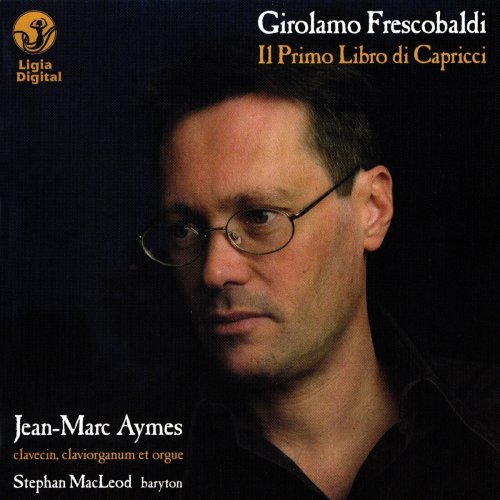
Jean-Marc Aymes - Frescobaldi: Complete Keyboards Works, Vol. 2 (Il primo libro di capricci, 1624) (2007)
BAND/ARTIST: Jean-Marc Aymes
- Title: Frescobaldi: Complete Keyboards Works, Vol. 2 (Il primo libro di capricci, 1624)
- Year Of Release: 2007
- Label: Ligia
- Genre: Classical
- Quality: FLAC (tracks+booklet)
- Total Time: 65:58 min
- Total Size: 374 MB
- WebSite: Album Preview
Tracklist:
01. Il Primo Libro di capricci: Capriccio sopra Ut, re, mi, fa, sol, la, F 4.01
02. Il primo libro di capricci: Capriccio sopra il Cucho, F 4.03
03. Il primo libro di capriccii: Capriccio sopra la Bassa Flamenga, F 4.05
04. Il primo libro di capricci: Capriccio sopra La, sol, fa, mi, re, ut, F 4.02
05. Il primo libro di capricci: Capriccio di Durezze, F 4.09
06. Il primo libro di capricci: Capriccio di obligo di cantare la quinta parte, F 4.11
07. Il primo libro di capricci: Capriccio sopra un soggetto, F 4.10
08. Il primo libro di capricci: Capriccio cromatico con ligature al contrario, F 4.08
09. Il primo libro di capricci: Capriccio sopra La, sol, fa, re, mi, F 4.04
10. Il primo libro di capricci: Capriccio sopra la Spagnoletta, F 4.06
11. Il primo libro di capricci: Capriccio sopra l'aria 'Or chè noi rimena' in partite, F 4.07
12. Il primo libro di capricci: Capriccio sopra l'aria di Ruggiero, F 4.12
01. Il Primo Libro di capricci: Capriccio sopra Ut, re, mi, fa, sol, la, F 4.01
02. Il primo libro di capricci: Capriccio sopra il Cucho, F 4.03
03. Il primo libro di capriccii: Capriccio sopra la Bassa Flamenga, F 4.05
04. Il primo libro di capricci: Capriccio sopra La, sol, fa, mi, re, ut, F 4.02
05. Il primo libro di capricci: Capriccio di Durezze, F 4.09
06. Il primo libro di capricci: Capriccio di obligo di cantare la quinta parte, F 4.11
07. Il primo libro di capricci: Capriccio sopra un soggetto, F 4.10
08. Il primo libro di capricci: Capriccio cromatico con ligature al contrario, F 4.08
09. Il primo libro di capricci: Capriccio sopra La, sol, fa, re, mi, F 4.04
10. Il primo libro di capricci: Capriccio sopra la Spagnoletta, F 4.06
11. Il primo libro di capricci: Capriccio sopra l'aria 'Or chè noi rimena' in partite, F 4.07
12. Il primo libro di capricci: Capriccio sopra l'aria di Ruggiero, F 4.12
Of the composers anointed by music history as great, Girolamo Frescobaldi may be the most difficult, at least prior to the modern era, for general listeners to come to grips with. He was manifestly a master contrapuntist, but playing through long sequences of similar works from his various publications rarely results in a satisfying listener experience. Keyboardist Jean-Marc Aymes, in a new series devoted to Frescobaldi's music, seems to be addressing the lack of fresh, engaging performances. He recognizes the need to break up the texture a bit, and both here and elsewhere in the series he re-sequences pieces for contrasting effect and, more importantly, plays several different instruments. This album is devoted to the First Book of Capricci by Frescobaldi, a 1623 publication that's not among the composer's most forward-looking works; despite the sound of the genre title, the capriccio at this point was a rather strict polyphonic form that looked back to Renaissance counterpoint. Several of the items on the album are dense explorations of simple themes denoted by solmization syllables, as in the "Capriccio IV sopra La, sol, fa, ré, mi" (track 9). Elsewhere, preexisting themes or bass patterns serve as the raw material for the contrapuntal essay, which as a work develops over five or six minutes and may enter some pretty chromatic territory. Aymes brings the polyphony to life with his choice of instruments, which makes each piece on the album sound different and attunes the listener's ear to the combination of musical lines. He plays a Renaissance Italian harpsichord, a gorgeous small Swiss organ, and, most unusually, a claviorganum, a rarely heard hybrid of organ and harpsichord. His notes on the instrument choices (in French only) assert that Frescobaldi would have been familiar with this instrument, and that his teacher, Luzzasco Luzzaschi, was a known virtuoso, but the central idea is not to present an "authentic" performance but one that is true to the music's spirit. He tops off the variety with an even rarer mode of performance, but one that is known to have occurred at the time: vocal performance of one of the parts of an instrumental polyphonic piece. This procedure, heard in the "Capriccio XI obligo di cantare la quinta parte" (track 6), even if it wasn't so odd for Frescobaldi's audiences, is unexpected enough to be totally delightful. This disc may be of more interest for the serious lover of 17th century polyphony than for the general listener, who might instead select Aymes' more varied double-disc companion recording of toccatas, canzonas, and other genres, or await the appearance of his reading of Frescobaldi's masterpiece, the Fiori Musicali (Musical Flowers). On its own terms, it's entirely enjoyable and whets the appetite for more in the same vein.
As a ISRA.CLOUD's PREMIUM member you will have the following benefits:
- Unlimited high speed downloads
- Download directly without waiting time
- Unlimited parallel downloads
- Support for download accelerators
- No advertising
- Resume broken downloads


